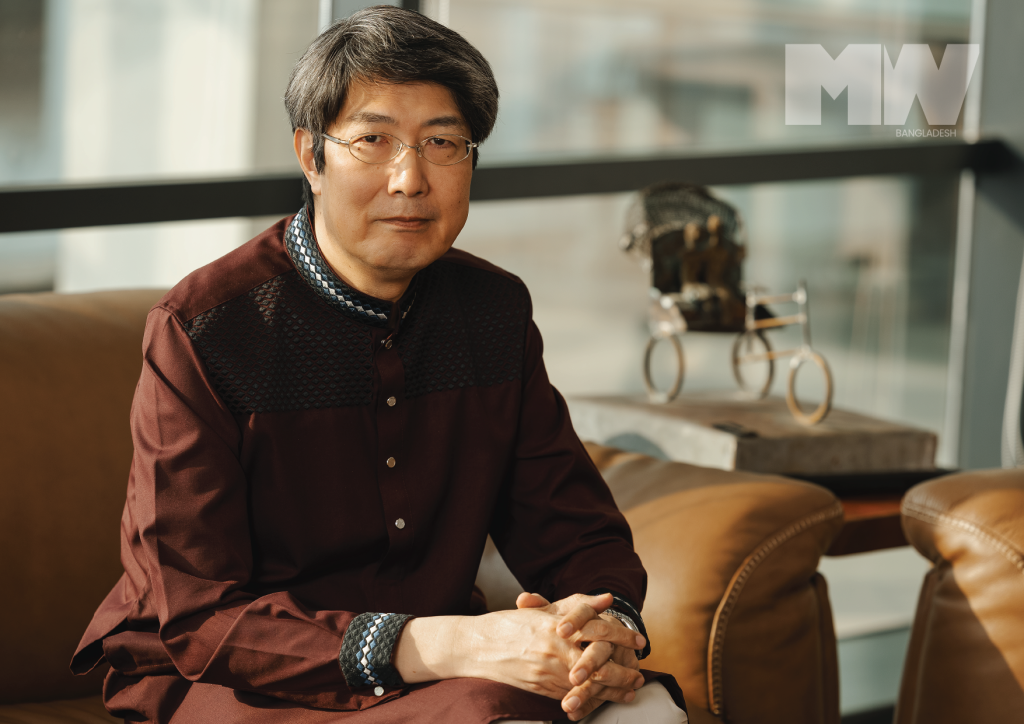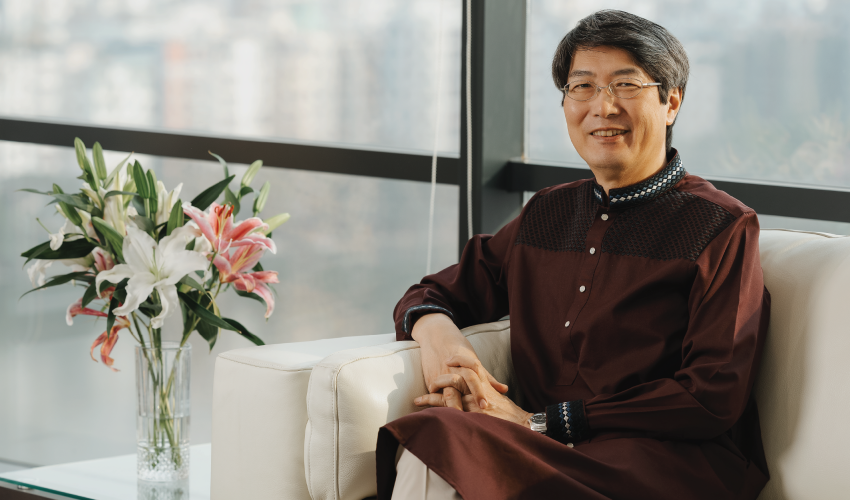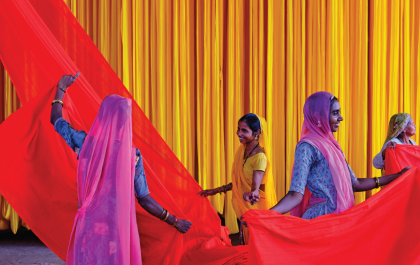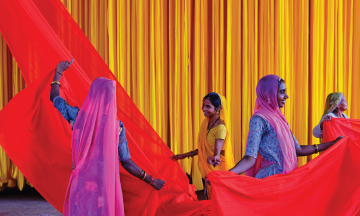In conversation with Japanese Ambassador Iwama Kiminori
By Sabrina Fatma Ahmad
It is late in the morning of an unseasonably warm and smoggy Friday in December of last year as we arrive at the Samson Centre, where we will be conducting an interview and photoshoot of the outgoing Japanese Ambassador, Iwama Kiminori. The lushly appointed office suits where the shoot will take place feature wraparound windows which offer an unparalleled view of the Gulshan 1 intersection and the lake behind it, all of which is shrouded in the city’s infamous air pollution. The Japanese ambassador arrives with his wife, fresh-faced after a recent visit to Nepal, and briefly alludes to the difference in air quality, before we settle down for our conversation.
Ambassador Iwama Kiminori has had diverse experiences in his diplomatic career. In 2003, he was appointed as Counsellor at Permanent Mission of Japan to the United Nations and Other International Organizations in Geneva and worked there for about three years. In August 2006, he was assigned as a Director of Loan Aid Division, International Cooperation Bureau, MOFA, and from July 2007 to July 2009, His Excellency was working as a Director of Oceania Division, Asian and Oceanian Bureau. After that, he was assigned to work as a Chamberlain to the Crown Prince at Imperial Household Agency. In 2012, he was posted in Thailand, as Minister for Economic Affairs, and subsequently to Berlin, Germany as Minister for Head of Chancellery and public diplomacy in 2014. Ambassador Iwama returned to Tokyo in July 2018 and served as Chief of Protocol at MOFA until January 2020, and in December of 2022, made his way to Bangladesh as the Japanese Ambassador.

In person, the Ambassador cuts an imposing figure in the plum panjabi he has selected to wear for the photo shoot. We’ve been briefed not to get too political in our discussion as at this point the Ambassador’s tenure in Bangladesh was coming to a close. I asked him what his dreams are.
“Well, it’s very hard to say. I’m already 61 years old and soon will be approaching retirement age. And I have been working as a diplomat for almost 40 years. There are so many things that I did as a diplomat. And maybe the next posting, I will also serve as an ambassador. And I will do my best to strengthen the relationship with that country as well. After retirement we would like to enjoy our life because you know the life is very, very hectic for us.”
This is a fairly modest answer, considering that during his brief tenure in Bangladesh, the Ambassador has been present for the signing of several MoUs between our governments, ensuring a higher level of economic cooperation between our nations, and peace and stability in the region. He attended ceremonies for several mega infrastructure projects which the Japanese government and Japanese companies engaged with, including the opening and extension of the Dhaka Metro Line 6 and the soft launch of Terminal 3 of Hazrat Shahjalal International Airport.

Japanese culture has gifted the world with concepts like ‘ikigai’ (confluence of purpose, calling and vocation) and ‘wabi sabi’ (the perfection of imperfections) to name a few, and these are now popular amongst wellness practitioners as ingredients for a happy life. Where do you find happiness?
“Well, it depends on the definition of the ikigai or the happiness. Well, yes, ikigai means the meaning of the life, literally translated. And well, it’s controversial, but until recently, Japanese lifestyle has been too concentrated on work. And too many people are enjoying working in the company or working in some activities for their own sake. But recently, just like the author of the Ikigai book said, we should think about some happiness other than the work. Nowadays the work-life balance is also a trendy term for the Japanese people. So, I think soon we will have some good balance between work and life. I wish I could have a better balance. So far, I’ve had a very difficult time finding that good balance. But I do believe that in the years to come, also for the Japanese people, we can find some solution.” He adds that he enjoys reading, films, and travelling, referencing the Sundarbans, Rajshahi, and Chattogram as some places in Bangladesh that he has enjoyed visiting.
Of course, work was a big part of these visits. The Japanese government has been vocal in its support for Bangladesh in its role as a host to the approximately one million Rohingya refugees. His Excellency has made several visits to the camps located in Cox’s Bazaar and Bhasan Char to provide heartfelt support to the displaced persons and the host communities.
A friend in need
“Whoever I meet [here], says ‘Japan is an old friend of ours, we have a very good relationship with Japan,’ not just because I’m a Japanese diplomat; even ordinary citizens explained to us about the good, friendly relations with us, with Japan,” Ambassador Iwama muses when asked about avenues for cooperation.
In March 2023, the mayors of Narayanganj and Naruto city signed a friendship city agreement. This is the first ever friendship city agreement in Bangladesh, commemorated with a cherry blossom tree plantation ceremony held in Narayanganj in November. In addition, from September the same year, Biman Bangladesh airline resumed its direct flights between Dhaka and Narita. More encouragingly, the deployment of Japan Overseas Cooperation Volunteers (JOCV), which had been suspended since the terrorist attacks at Holey Artisan Bakery in 2016, which resulted in the deaths of Japanese citizens, also resumed.
“Based upon mutual trust and reliance, I think we can have a very good relationship in every aspect. We have, as you know, good economic relations. I think we can enjoy the human-to-human bonds through various areas such as the university-to-university or the city-to-city [partnerships] or when some young generation of Japan visits the Bangladesh cities or the rural areas as JICA volunteers and so on. Accumulating all those kinds of elements, we could enjoy a very tight, very strong relation with your country.”

The finer print
It is of course, encouraging to see that the relations between the two countries are continuing to strengthen. Responding to the queries about the recent incorporation of the VFS agency to facilitate the visa process for Bangladeshi travelers seeking to visit Japan, the Ambassador clarified: “Because the number of applicants is so big, it’s very difficult for us to take care of everything. So that’s why, as far as the initial screening is concerned, we tasked the agency. But after that, we take over. Obviously, we do hope that the process should be shortened because of the introduction of the new system, but the interview and the back and forth with the capital – that should remain the same. So please don’t expect to have very shortened procedures.”
It’ll be hard not to talk about the big paradigm shift that we’ve had this year. And what are some areas that, as a neutral observer, you can say that we need to work on to rebuild ourselves right now?
“I’ve always said to my colleague of Bangladesh that it is you, the citizens of Bangladesh, who should decide what to do or which direction you want to go. And of course, there are some ideas from outsiders like Japan or other countries, maybe US, maybe other countries. But our style, the Japanese style, is not to impose what you should do or what the country of Bangladesh should do, but we task you to think about [suggestions and avenues for change]. Having said this, I can say one thing is that this new government is aiming for the reform. And the Japanese business sectors are interested in having a closer relationship with the counterpart of the Bangladesh side. In order to do so, we need the improvement of the investment environment. I’m always saying in the context of the economic relations, but I think this kind of confidence building between the two sides, not only in terms of the business to business, but also the government to government or any field, this kind of a mutual trust is very important, and to strengthen the transparency in every aspect is one of the key elements. My main focus is, as you noticed, in terms of the economic relations, but it applies to every relationship.”
Is there some hope for the future?
“The short answer is that we should always be more optimistic. Yes, you are right that there are so much uncertainties, not only in terms of the economic sectors, but also in terms of the political and security sectors. In 2024, we experienced so many changes in all over the world, I think. Let’s do hope the situation will get better,” the Ambassador muses.
As we wrap up our conversation and head upstairs for the delicious lunch provided by our generous hosts, His Excellency shares some observations about the differences in the cultures of the countries he has served in, talking about countries such as Thailand and Bangladesh as they move towards greater economic development, there tends to be a shift towards more individualism, although he is quick to clarify that he is not making any value-based judgement in this regard. He surprises a laugh out of us by quipping that he will miss Dhaka’s traffic, but offers a more sincere answer that he will miss the ease of working in a country that has such warmth towards his own.
Photographed by Salek Bin Taher














